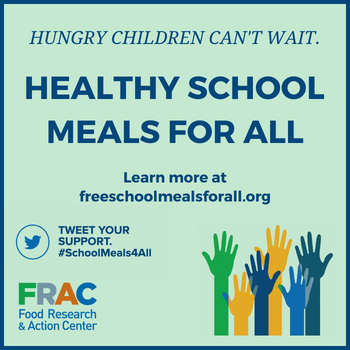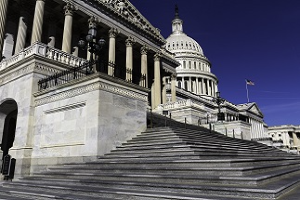
ACT NOW: Congress Must Act Quickly to Restore Harmful SNAP Cuts
Congress must take immediate action to repeal the devastating cuts and harmful impacts on the Supplemental Nutrition Assistance Program (SNAP) that were included in the budget reconciliation law, H.R. 1. Anti-hunger advocates are urging Members of Congress to cosponsor and support the Restoring Food Security for American Families and Farmers Act of 2025, which repeals the cuts to SNAP.
- Share with your Members of Congress these new FRAC resources:
- Use the FRAC Action Network to easily send your Members of Congress a pre-populated email, or craft your own;
- Get vocal on social and tag your Members.
For more information on engaging with your Members, contact Tim Klipp-Lockhart, tklipp-lockhart@frac.org, and for information on SNAP, Gina Plata-Nino, gplata-nino@frac.org.
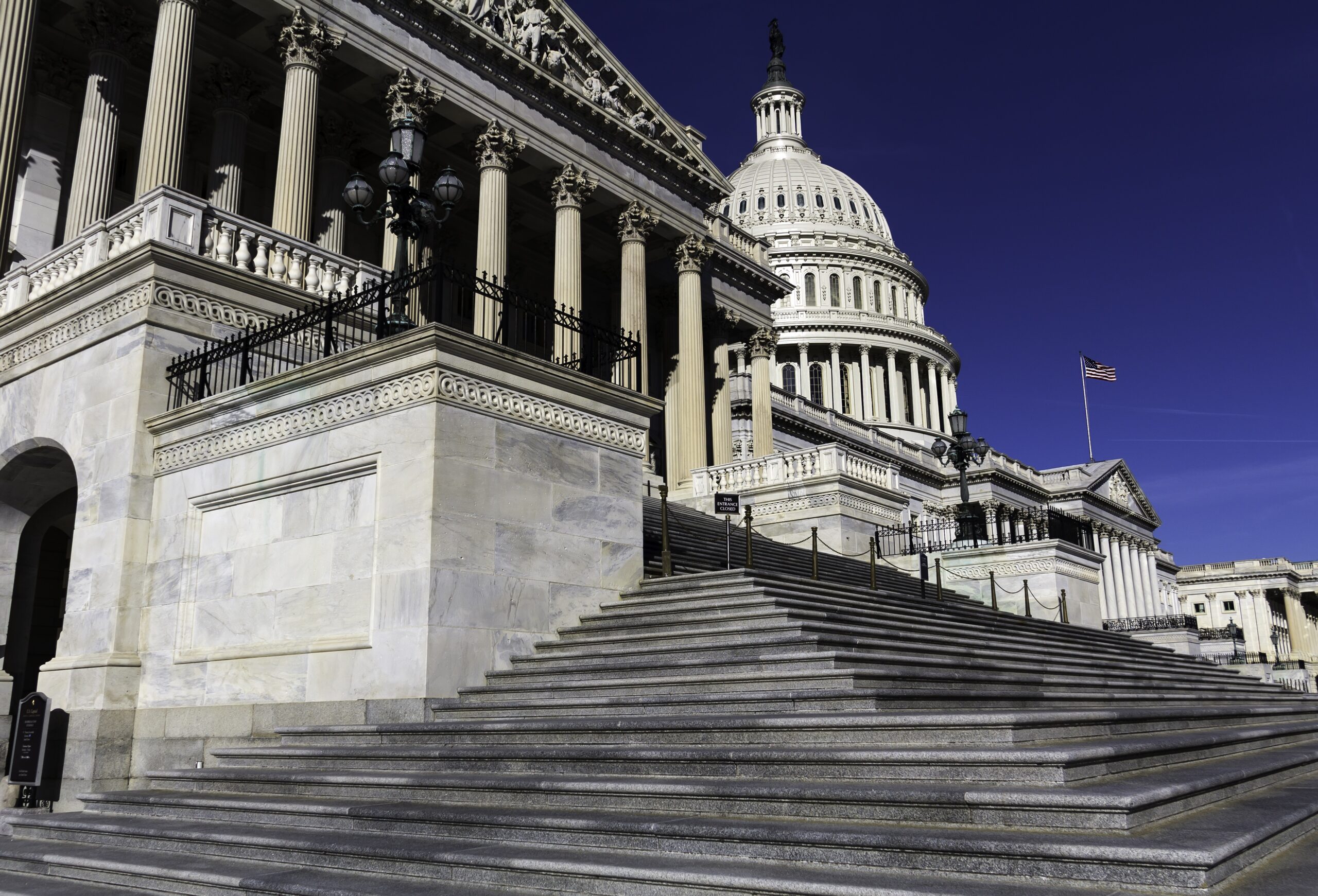
Fiscal Year 2026 Funding for Food and Nutrition Programs
The Senate’s FY 2026 Agriculture Appropriations bill (majority summary) (minority summary) includes annual funding (fiscal year 2026) for the federal food and nutrition programs. Most notably, the bill increases funding for the Special Supplemental Nutrition Program for Women, Infants, and Children (WIC) to $8.2 billion — a $603 million boost from fiscal year 2025 — an amount expected to fund all those who apply for the program. The bill also protects the full WIC cash value benefit (CVB), which provides fruit and vegetable vouchers to WIC participants.
Food and Nutrition Program Highlights
Annually Appropriated Programs (discretionary programs):
- $8.2 billion for WIC to ensure approximately 7 million women, infants, and young children with low incomes have access to healthy and nutritious foods. The bill also fully funds the WIC CVB at $26 for children, and between $47 to $52 a month for adults, and replenishes the WIC contingency fund at $150 million.
- $80 million for The Emergency Food Assistance Program (TEFAP) administrative funding for storage and distribution costs
- $460 million for the Commodity Supplemental Food Program (CSFP) to provide food boxes to approximately 700,000 seniors with low incomes
- $10 million for the Seniors Farmers’ Market Nutrition Program (SFMNP)
Mandatory Programs (subject to annual appropriations):
- $37.8 billion in mandatory funding for child nutrition programs – school lunch and breakfast, summer nutrition, including Summer EBT, Afterschool Snacks and Meals, and the Child and Adult Care Food Program (CACFP). This funding includes $5 million for Farm to School programs and also an additional $10 million in annual funding for school equipment grants.
- $107 billion in mandatory funding for the Supplemental Nutrition Assistance Program (SNAP) to serve the approximately 42 million people who participate in the program. The bill also replenishes the multiyear SNAP contingency fund at $6 billion.
- $471.5 million for TEFAP commodity purchases
Other Important Food and Nutrition Programs (international):
- $240 million for the McGovern-Dole International Food for Education and Child Nutrition Program
- $1.2 billion for the Food for Peace Program

Budget Reconciliation
Digital Media Toolkits
Fact Sheets
- Playbook: Supporting State Economic Stability and Strength After H.R. 1 SNAP Cuts
- Cuts to SNAP Threaten the Child Nutrition Programs
- SNAP Cost-Shifts Will Increase Hunger, Strain State Budgets, and Deepen Economic Risk
- Table: Economic Strain and New SNAP Cost-Shifts Under H.R. 1 Across All States
- Impact of H.R. 1 on Thrifty Food Plan
- Final Budget Reconciliation Bill Impacts Fact Sheet (Updated: July 15, 2025)
- National SNAP Impact Fact Sheet
- State SNAP Impact Fact Sheets
- State CEP Impact Fact Sheets
Statements / Press Releases
November 14, 2025 – FRAC, CBPP, and Nearly 1,500 National, State, and Community-Based Organizations Urge Congress to Restore SNAP Funding
October 31, 2025 – Repealing Historic SNAP Cuts, Investing in Community Eligibility Provision Are Critical to Children’s Health and Learning
October 4, 2025 – USDA Sets Unreasonable Deadline for States to Implement Harmful SNAP Cuts
September 9, 2025 – Poverty Report Underscores Immediate Action Needed to Repeal SNAP Cuts, Support Federal Nutrition Programs
August 12, 2025 – CBO Report Warns SNAP Cuts Will Deepen Hunger, Harm Households
July 3, 2025 – House Pushes Through Senate’s Harmful Budget Reconciliation Bill, Ignores Warnings From National, State, and Community Organizations
July 1, 2025 – Senates Passes Disastrous Budget Bill, FRAC Urges House to Stop Dangerous Cuts
June 28, 2025 – FRAC Urges Senators to Reject Deeply Flawed Budget Bill, Unprecedented Proposals to Cut SNAP Would Set America Back
June 11, 2025 – Senate Agriculture Committee Doubles Down on Harmful SNAP Cuts, FRAC Urges Congress to Vote ‘No’ on Budget Reconciliation Bill
May 22, 2025 – House GOP Passes Bill That Rolls Back Decades of Progress in Ending Hunger in America
April 10, 2025 – Budget Blueprint Passed by Senate, House Threatens Food Security and Health of Millions of Americans
March 11, 2025 – Proposed Cuts to School Meals Would Harm Students, Families, and Schools
March 5, 2025 – More Than 1,800 National, State, and Community Organizations Urge Congress to Protect, Strengthen Supplemental Nutrition Assistance Program
February 27, 2025 – FRAC Releases State-by-State Analysis on SNAP Participation, Illustrates Harm Cuts to SNAP Would Have on Children, Older Adults, Veterans, Rural Communities
February 14, 2025 – FRAC Warns Proposed Cuts to SNAP and Child Nutrition Programs Would Spike Hunger, Strain Economy
Analysis & FRAC Chat Blogs
Historic SNAP Cuts Threaten Families, States, and the Future of Food Assistance (FRAC’s analysis of the House Agriculture Committee’s reconciliation bill)
January 9, 2025 – 5 Actions to Protect Child Nutrition Programs From SNAP Cuts
October 31, 2025 – SNAP Cuts in H.R. 1: Billionaires Win, Working Families Lose
October 24, 2025 – A Behind the Scenes Look at SNAP
October 10, 2025 – Q&A: How Does the New SNAP Time Limits Policy Affect You? What States and Families Need to Know
September 5, 2025 – 12 Actions Advocates and States Should Take Now to Mitigate Harm of H.R. 1 SNAP Cuts
August 26, 2025 – How Cuts to the Nation’s Largest Nutrition and Health Programs Will Hurt Families and Young Children
August 25, 2025 – SNAP’s Critical Role in Rural Communities – and the Consequences of Cuts
August 8, 2025 – Q&A: Understanding SNAP Time Limits and the Burden of Expanded Work-for-Food Requirements
July 24, 2025 – Shifting the Burden: How the Recently Passed Budget Reconciliation Package Reshapes SNAP and Strains State Budgets
July 11, 2025 – The Far-Reaching Harmful Impacts of the Reconciliation Bill – on Families, Older Adults, Immigrants, and State Budgets
July 2, 2025 – Senate SNAP Bill Heads Back to House for Final Vote
July 2, 2025 – The Deep Cost of the Senate Bill’s SNAP Cost-Share Proposal: 10 Things to Know
June 26, 2025 – SNAP Cuts in Reconciliation Would Have Far-Reaching Ripple Effects on Communities Nationwide
June 25, 2025 – FRAC Report Shows More Schools Are Using CEP to Offer Free School Meals, Highlights What’s at Risk With Proposed SNAP Cuts
June 12, 2025 – Senate Follows House Lead on SNAP Cuts Proposal: A Direct Threat to Families, Communities, and the Economy
May 19, 2025 – Municipal Leaders Warn: SNAP Cuts Would Devastate Local Economies and Families
May 16, 2025 – House Republicans Advance Deep Cuts to SNAP, Shifting Costs to States While Hunger and Economic Pressures Mount
May 15, 2025 – Summer EBT at Risk of Impacts from SNAP and Medicaid Cuts
May 2, 2025 – Budget Reconciliation Update: Cuts to SNAP are Cuts to School Meals
April 4, 2025 – Proposed Cuts to SNAP and Medicaid Would Negatively Impact WIC
March 11, 2025 – As Food Prices Increase, Protecting SNAP Is More Important Than Ever
February 7, 2025 – Three Things You Can Do Right Now to Protect SNAP
January 17, 2025 – New Proposal Drastically Reduces Number of Schools Eligible for Community Eligibility Provision
The True Impact of SNAP Cuts (9-Part Blog Series)
April 9, 2025 – From City Hall to the Dinner Table: How SNAP Cuts Impact Communities (Part 1)
April 14, 2025 – From City Hall to the Dinner Table: How SNAP Cuts Impact Communities (Part 2)
April 17, 2025 – The Real Cost of Cutting SNAP: Jobs Lost, Stores Closed, Communities Undermined (Part 3)
April 22, 2025 – Proposed SNAP Cuts: The Health and Economic Impact on Families With Young Children (Part 4)
April 24, 2025 – Slashing SNAP Means Small Towns Suffer: The Costs of Cuts to Food Assistance (Part 5)
April 28, 2025 – SNAP Cuts Threaten the Fabric of Rural Communities: Farms, Families, and Small Businesses (Part 6)
May 8, 2025 – Cutting SNAP: How Harmful Policy Proposals Threaten Communities and Rural Food Systems (Part 7)
May 14, 2025 – Why Food Access Is a Public Safety Issue: A Cincinnati Councilmember’s Call to Protect SNAP (Part 8)
Interactive Data
- SNAP State-by-State Data Map
- SNAP Data by Congressional District
- Senate vs. House Budget Reconciliation Versions Comparison
Impact

Fiscal Year 2026 Budget and Appropriations Priorities for Food and Nutrition Programs
The federal nutrition programs are a critical support for tens of millions of households – helping them put food on the table during times of need. Investing in hunger prevention and relief also makes smart fiscal sense.
Find budget and appropriations priorities for SNAP, child nutrition programs, TEFAP, older adults nutrition programs, FDPIR, and more in FRAC’s 2025 budget and appropriations leave behind for the National Anti-Hunger Policy Conference.

Budget Reconciliation 101
Curious about Budget Reconciliation? Check out FRAC’s Budget Reconciliation 101 fact sheet, updated for 2025, for a primer on the process, steps to look out for, and more.
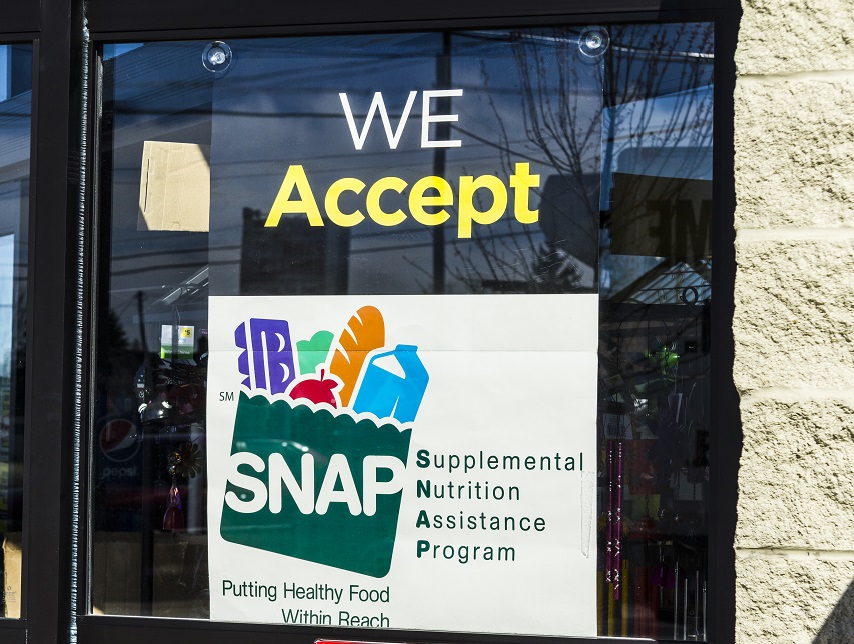
Check Out SNAP Bills We’re Supporting
Check out FRAC’s Bills We’re Supporting page for bills introduced in the 117th Congress related to budget, appropriations, anti-poverty policy, and other critical issues.

Congress has voted to avert a government shutdown — passing a so-called “clean” Continuing Resolution (CR) that will keep the government funded through November 17.
The bill includes funding and authority for USDA to spend Special Supplemental Nutrition Program for Women, Infants, and Children (WIC) funds at the rate necessary to maintain heightened levels of participation; however, the bill does not include the $1.4 billion in additional WIC funds requested by the White House.
Take action now to keep our nation’s pregnant and postpartum women, infants, and young children well-nourished and fed. In the latest Continuing Resolution (CR, set to expire on Nov. 17), WIC is authorized to spend more money to accommodate rising food prices and caseloads; however, Congress must provide additional funds to avoid waiting lists and an interruption in benefits. Use the FRAC Action Network to send a populated email message directly to your Members of Congress to fully fund WIC.
House lawmakers failed to pass FY 2024 spending bills, including the Agriculture-FDA spending bill. See the roll call vote on H.R. 4368, the draconian Agriculture appropriations bill, and also House Appropriations Ranking Member Rep. DeLauro’s (D-CT) statement on the House’s rejection.
Reference Coalition on Human Needs’ FY 24 Budget Resource Library for more.
On the Road to the Farm Bill
With the vacant House Speakership, the timing of the Farm Bill remains uncertain.
While the end of the year remains a hard deadline for many titles to be reauthorized, there was speculation that the bill would be delayed until early next year, after the passage of the FY 2024 appropriations package. Advocates must continue to protect and strengthen SNAP as Congress resumes work on the Farm Bill.
Go to the FRAC Action Network to contact your Members of Congress and to urge them to support and cosponsor FRAC’s Farm Bill priority legislation quickly and easily. Use FRAC’s Road to the Farm Bill and Bills We’re Supporting page for additional resources to advocate for families struggling against hunger.

On March 9, House and Senate appropriators announced a bipartisan $1.5 trillion omnibus agreement to fund the federal government through September 30, 2022. The Agriculture, Rural Development, Food and Drug Administration, and Related Agencies funding bill, one of 12 subcommittee bills contained in the omnibus, overall provides $25.125 billion – an increase of $1.426 billion, six percent above 2021. The Committee highlights can be found here and a division-by-division summary of the bill as introduced is here.
What is In the Bill:
WIC: The bill expands access to fruits and vegetables to the WIC program through September 30, 2022, for more than 4.75 million women and children participating in the Special Supplemental Nutrition Program for Women, Infants, and Children (WIC). The bipartisan agreement funds WIC at $6 billion, with a $621.7 million rescission. The bill continues WIC set-aside funding, including $90 million for breastfeeding peer counselors and $14 million for infrastructure.
SNAP: The bill provides $140.4 billion in required mandatory spending for the Supplemental Nutrition Assistance Program (SNAP), including $3 billion for the SNAP reserve fund, which serves more than 42 million people. This provision is expected to fund anticipated SNAP participation including the SNAP enhanced allotments that was authorized by the Families First Coronavirus Response Act and increased benefits from USDA’s Thrifty Food Plan Review. The bill also supports $3 million to carry out pilots authorized in the 2018 Farm Bill to allow Indian Tribal Organizations, rather than USDA, to directly purchase commodities.
Child Nutrition Programs: The bill provides $26.9 billion in funding for child nutrition programs. This funding is an increase of $1.77 billion above the FY 2021 level. The funding is expected to support more than 5.2 billion school lunches and snacks. In addition, the bill provides $45 million for the Summer EBT program, $30 million for school kitchen equipment grants, $12 million for Farm to School Grants, and $6 million for school breakfast expansion grants.
TEFAP and Commodities: The bill funds $399.75 million for The Emergency Food Assistance Program (TEFAP) food purchases, which is outlined in the 2018 Farm Bill. This is an increase of $57 million to include USDA’s adjustment of the Thrifty Food Plan. The bill allows an option for up to 20 percent of TEFAP funds to be used for costs associated with the distribution of commodities. The bill provides $81 million in administrative funding for TEFAP storage and distribution, $126 million for the Food Distribution Program on Indian Reservations (FDPIR), $332 million for the Commodity Supplemental Food Program (CSFP), and $26 million for the Farmers’ Market Nutrition Program.
Child Care Programs: In addition to nutrition provisions, child care funding is increased. Community Development Block Grant programs are increased to $7.37 billion, up from FY21 level of $5.9 billion and the Head Start program to $12.1 Billion, up from FY21 of $10.75 billion.
Other Provisions: The bill also includes $2 million for the Congressional Hunger Center – Bill Emerson and Mickey Leland Congressional Hunger Fellows, $966.9 million for Older Americans Act senior nutrition programs, $24.8 million for Older Americans Act health promotion and disease prevention services, $1.7 billion for the Social Services Block Grant (SSBG), $7.37 billion for the Community Development Block Grant (CDBG), and $2.5 million to convene a White House conference in 2022 to address food, nutrition, hunger and health.
What is NOT in the Bill:
The bill fails to include authority for USDA to extend child nutrition waivers which provide flexibility for school meal programs. The waivers, which are set to expire on June 30, kept school meal programs funded by reimbursing free meals at a higher rate to offset the rising labor, food, and supply chain costs. A recent USDA report underscores the negative impact of supply chain disruptions and staffing challenges on school nutrition programs during the 2021-2022 school year. It also found that nearly 90 percent of school districts used the Seamless Summer Option (SSO) waiver to serve meals for school year 2021-2022, which allows schools to offer all students meals at no charge and again provides higher reimbursement rates which have been needed to support nutrition finances during the pandemic and its after effects.
FRAC Statement and Joint Coalition Statement on Extension of Child Nutrition Waiver Authority Left Out of Omnibus
FRAC Statement
Joint Coalition Statement

On February 17, just hours before government funding was set to lapse on February 18, the Senate approved, and President Biden signed, a House-passed short-term spending bill (H.R. 6617) to extend current federal government operation funding levels until March 11, 2022. Spending levels set during the Trump Administration have now continued for five months beyond the start of Fiscal Year (FY) 2022, following the passage of this Continuing Resolution.
It is paramount that Congress acts now to pass an omnibus appropriations bill that sufficiently funds crucial programs through the end of the Fiscal Year (September 30, 2022). As agreement draws near, advocates are encouraged to review FRAC’s analysis of differences between FY 2021 funding levels and the House-passed and Senate-proposed agriculture appropriations bills. FRAC and its partners will continue to call for an extension to USDA’s school meal waiver authority as a part of the appropriations process.

On November 19, by a vote of 220 to 212, the House passed the Build Back Better Act (BBBA) (H.R. 5376), which makes key investments in child nutrition and other important programs. FRAC President Luis Guardia applauded the action, calling the bill “a critical next step in the right direction toward addressing the alarming rates of childhood hunger and poverty in this country.” Since then, the Build Back Better Act has stalled considerably in the Senate. Advocates continue to urge all Senators to consider the positive impact the bill’s child nutrition provisions, and other anti-poverty priorities (e.g., the Child Tax Credit), would have on constituents in their state.
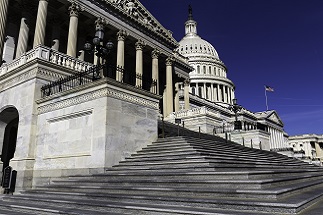
Rep. Rosa Delauro (D-CT), Chair of the House Committee on Appropriations, introduced the short-term Further Extending Government Funding Act (H.R. 6119) on Thursday, Dec. 2, a day before current government funding was set to expire. Extending funding to February 18, 2022, the bill passed the House by a vote of 221 to 212 and quickly cleared the Senate by a vote of 69 to 28.
Critically, the deal includes language that will prevent a dramatic drop in WIC benefits on January 1 by extending current levels to March 31, 2022. This provides a continuation of the larger cash value for fruits and vegetables in WIC. An extension of SNAP benefits for residents of Supportive Living Facilities was also included.
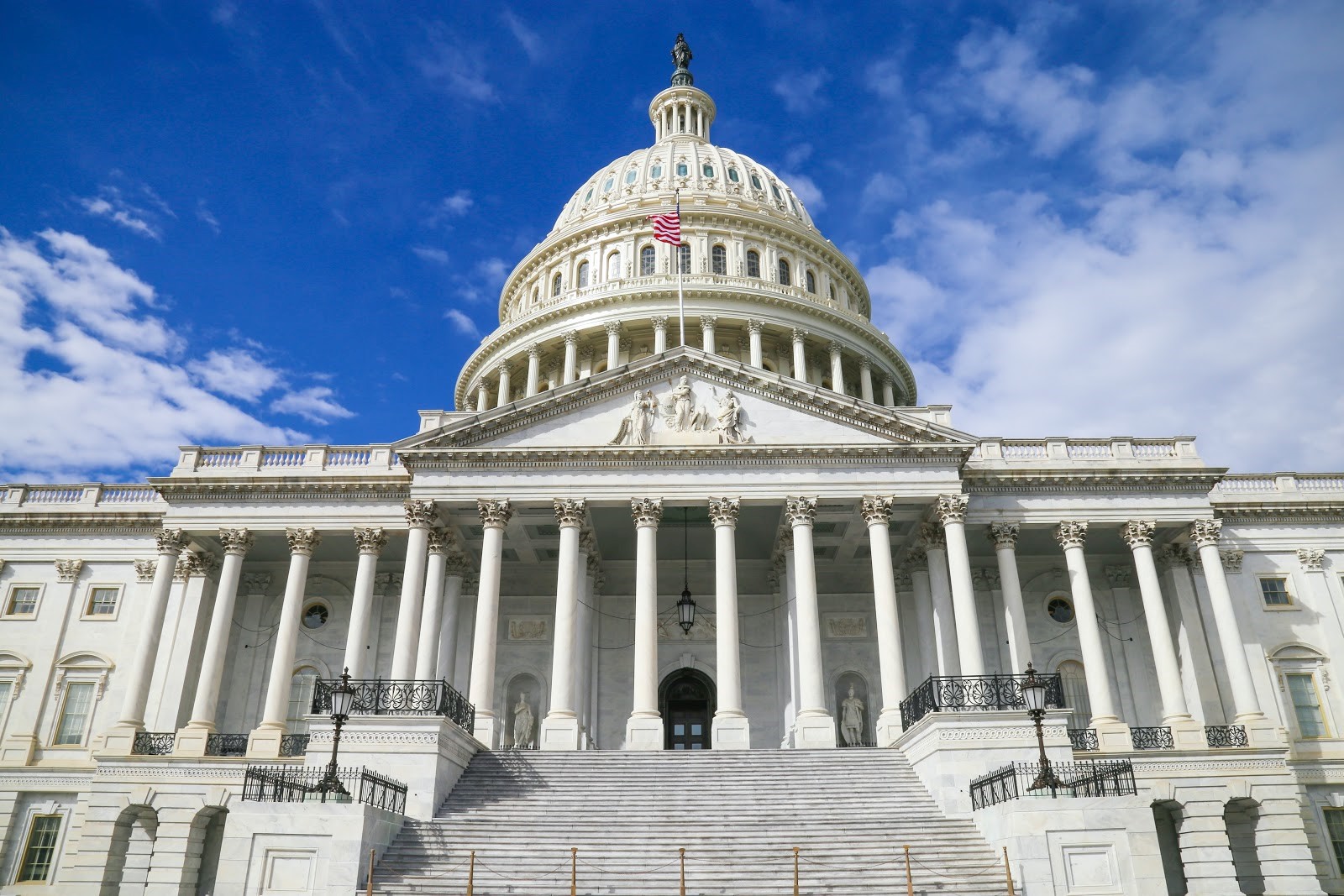
On July 29, by a vote of 219-208, the House passed its fiscal year (FY) 2022 agriculture appropriations (spending) bill, H.R. 4356, in a package including six other appropriations bills (H.R. 4502). Check out FRAC’s analysis of the House and Senate agriculture appropriations bill for more information.
On August 4, the Senate Appropriations Committee, by a vote of 25-5, advanced its fiscal year (FY) 2022 Agriculture, Rural Development, Food and Drug Administration, and Related Agencies appropriations bill (S. 2599). Read a summary of the Senate bill from the Senate Appropriations Committee and our analysis comparing its proposals with the House-passed legislation.
By Dear Colleague letter, dated November 14, Senate Majority Leader Chuck Schumer (D-NY) outlined the Senate agenda for the rest of 2021. On December 2, Congress passed the Further Extending Government Funding Act (H.R. 6119), a stopgap funding bill (a continuing resolution), that will fund government operations through February 18, 2022. FRAC and more than 20 other national organizations recently urged Members of Congress to include an extension of the U.S. Department of Agriculture’s (USDA) school meal waiver authority in ongoing appropriations legislation.

President Biden’s FY 2022 Budget
On Friday, May 28, the White House released President Biden’s proposed FY 2022 budget. Check out the fact sheet from the Office of Management and Budget.

Update on Recovery Plans
On April 28, President Biden presented the American Families Plan, which includes nutrition program investments that ensure children have access to the nutrition they need year-round, as well as other critical investments needed to offset rising hunger by providing much-needed assistance to low-income households. Urge Congress to move quickly and enact the American Families Plan and to pass additional relief packages.
On March 11, the American Rescue Plan Act of 2021 was signed into law. The COVID-19 relief bill will help bolster nutrition assistance for tens of millions of people across the country.

Congress Passes Year-End Package with COVID Relief and FY 2021 Appropriations
Before leaving for the holidays, Congress passed the Consolidated Appropriations Act, 2021, a package that would provide an immediate and essential downpayment on nutrition and other critical assistance for tens of millions of people across the country whose lives have been upended by the pandemic. The relief package boosts the SNAP maximum benefit by 15 percent for six months (through June 30, 2021), among other nutrition and anti-poverty provisions. Check out FRAC’s statement for more information, as well as the Congressional division-by-division summaries of the COVID relief provisions, appropriations provisions, and authorizing matters of the package. The President signed the bill into law on December 27, 2020.

President’s FY 2021 Budget Would Increase Hunger and Poverty in America
On February 10, the president released his proposed FY 2021 budget. The budget recycles many of the harmful policy proposals in the administration’s previous budgets, including deep cuts to federal safety net programs. The budget would cut SNAP benefits by more than $180 billion over 10 years, including by reprising the widely ridiculed “America’s Harvest Box.” These proposed deep cuts to SNAP are on top of the billions of dollars in ten-year SNAP benefit cuts that the administration is seeking via rule makings. The budget would also cut school meals by $1.7 billion over 10 years by reducing the number of schools eligible to implement the Community Eligibility Provision and by changing the process for verifying school meal applications, which would result in eligible students losing access to free and reduced-price school meals. Read FRAC’s statement and detailed analysis of the president’s proposed budget.
Explore These Topics
- FY 2021 AppropriationsOn December 27, 2020, the Consolidated Appropriations Act, 2021 was signed into law, which provided FY 2021 appropriations and an immediate and essential downpayment on nutrition and other critical assistance for tens of millions of people across the country. The relief package boosts the SNAP maximum benefit by 15 percent for six months (through June 30, 2021), among other nutrition and anti-poverty provisions. Check out FRAC’s statement for more information, as well as the Congressional division-by-division summaries of the COVID relief provisions, appropriations provisions, and authorizing matters of the package.
Stay up-to-date on the federal appropriations process through the Congressional Research Service’s Appropriations Status Table.
- Refundable Tax CreditsThe Earned Income Tax Credit (EITC) and the Child Tax Credit (CTC) are critical anti-poverty programs and should be expanded. In 2019, the EITC and CTC together lifted about 7.5 million people above the poverty line, including 4 million children. Both of these tax credits are refundable, meaning that they can reduce a filer’s tax burden to zero and any remaining amount is treated as a direct refund to the filer.
Income thresholds for the EITC are dictated by marital status and number of children. The amount of the EITC depends on the filer’s income, the number of children, and marital status. In 2020, the EITC is worth a maximum of $6,660, but the EITC for childless workers is worth only $529. In 2021, thanks to temporary changes in the American Rescue Plan Act, the maximum for childless workers was increased to $1,502.
The American Rescue Plan Act also included a robust expansion of the Child Tax Credit (CTC) which is projected to cut child poverty nearly in half. The improved CTC will provide families with $3,600 per child under age 6 and $3,000 per child ages 6-17. This benefit is now available to families with little or no income who were previously excluded from the CTC benefit.
While this is great news, this expansion is authorized for just one year. Congress and the White House must make these program improvements permanent. President Biden’s American Families Plan would, in addition to critical nutrition and other investments, make permanent the full refundability of the CTC to provide support to families who have been affected by the pandemic and for parents who have been forced to cut down on work or give up jobs to take care of children after losing access to child care.

Did You Know?
Every year, Congress is supposed to follow a similar schedule of events throughout the budget and appropriations process. However, in recent years, this process has not always been followed — but the general schedule remains the same.

